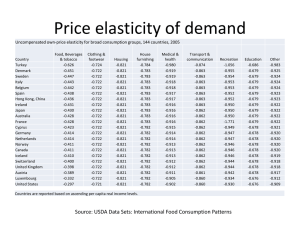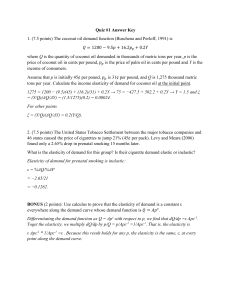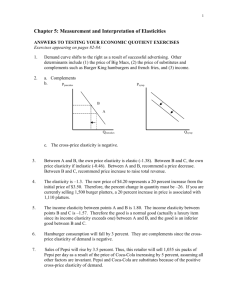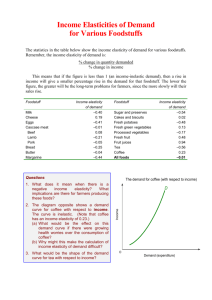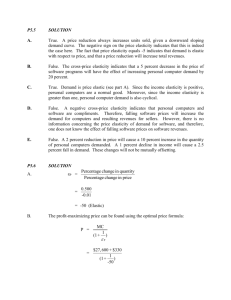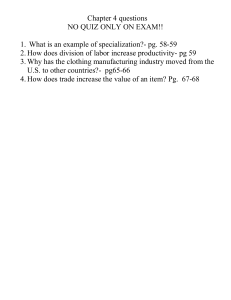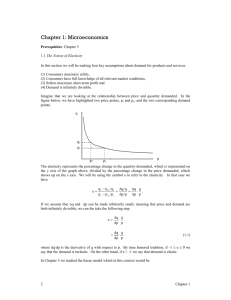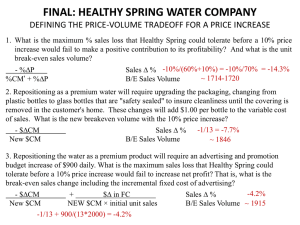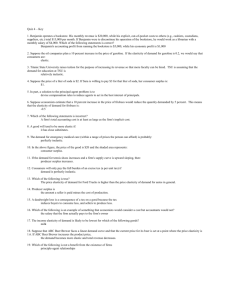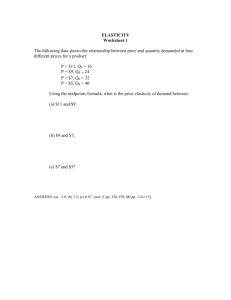At first, we theoretically explores price effect of domestic oil tax
advertisement
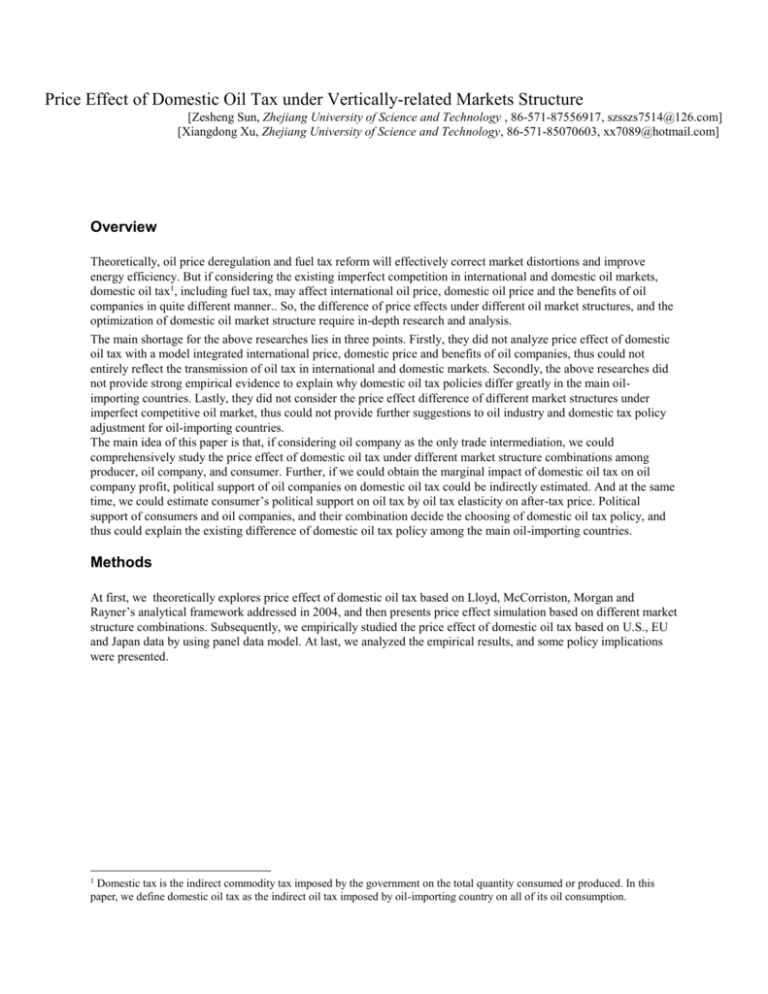
Price Effect of Domestic Oil Tax under Vertically-related Markets Structure [Zesheng Sun, Zhejiang University of Science and Technology , 86-571-87556917, szsszs7514@126.com] [Xiangdong Xu, Zhejiang University of Science and Technology, 86-571-85070603, xx7089@hotmail.com] Overview Theoretically, oil price deregulation and fuel tax reform will effectively correct market distortions and improve energy efficiency. But if considering the existing imperfect competition in international and domestic oil markets, domestic oil tax1, including fuel tax, may affect international oil price, domestic oil price and the benefits of oil companies in quite different manner.. So, the difference of price effects under different oil market structures, and the optimization of domestic oil market structure require in-depth research and analysis. The main shortage for the above researches lies in three points. Firstly, they did not analyze price effect of domestic oil tax with a model integrated international price, domestic price and benefits of oil companies, thus could not entirely reflect the transmission of oil tax in international and domestic markets. Secondly, the above researches did not provide strong empirical evidence to explain why domestic oil tax policies differ greatly in the main oilimporting countries. Lastly, they did not consider the price effect difference of different market structures under imperfect competitive oil market, thus could not provide further suggestions to oil industry and domestic tax policy adjustment for oil-importing countries. The main idea of this paper is that, if considering oil company as the only trade intermediation, we could comprehensively study the price effect of domestic oil tax under different market structure combinations among producer, oil company, and consumer. Further, if we could obtain the marginal impact of domestic oil tax on oil company profit, political support of oil companies on domestic oil tax could be indirectly estimated. And at the same time, we could estimate consumer’s political support on oil tax by oil tax elasticity on after-tax price. Political support of consumers and oil companies, and their combination decide the choosing of domestic oil tax policy, and thus could explain the existing difference of domestic oil tax policy among the main oil-importing countries. Methods At first, we theoretically explores price effect of domestic oil tax based on Lloyd, McCorriston, Morgan and Rayner’s analytical framework addressed in 2004, and then presents price effect simulation based on different market structure combinations. Subsequently, we empirically studied the price effect of domestic oil tax based on U.S., EU and Japan data by using panel data model. At last, we analyzed the empirical results, and some policy implications were presented. 1 Domestic tax is the indirect commodity tax imposed by the government on the total quantity consumed or produced. In this paper, we define domestic oil tax as the indirect oil tax imposed by oil-importing country on all of its oil consumption. Results Domestic oil tax influences not only consumer oil price, but also oil company’s bid-ask spread and international oil price through vertically-related markets. This paper studies the price effects of domestic oil tax under vertical market structure theoretically and empirically, and has the following conclusions. If there is imperfect competition in oil production and trade intermediation, the price effects of domestic oil tax are different. When the demand and supply elasticity are both low, with the weakening of the production competition, oil-importing countries could more effectively influence international oil price by domestic tax, and oil producer(s) would bear more and more tax burden. When there is no strong competition among domestic oil companies, price transmission elasticity of domestic oil tax is negative, which means that international oil price drops and the asking price of oil companies rises while imposing domestic oil tax.; if there is strong competition among domestic oil companies, price transmission elasticity of domestic oil tax is positive, which indicates that both international oil price and the asking price of oil companies fall when imposing domestic oil tax. By analyzing the market structures of oil industry and oil demand elasticities in U.S., EU and Japan, the empirical study supports the above theoretical conclusion. For US, where the competition among oil companies is strong, price transmission elasticity of domestic oil tax is positive, i.e., the increase in domestic oil tax causes both international oil price and the asking price of oil companies to decrease. But for EU and Japan, where the competition among oil companies is weak, price transmission elasticity of domestic oil tax is negative, or the increase in domestic oil tax causes the international oil price to decrease and the asking price of oil companies to rise significantly, which means the tax burden is overshifted to consumers. The empirical study results for price effect of domestic oil tax can explain the deviation between the actual and optimal tax rates in U.S., EU and Japan. Because of the opposition of energy interest group, which is represented by the oil companies, and consumer’s sensitivity to gasoline price, the actual oil tax rate is far below its optimal value in U.S.; while the oil companies and environmentalist in EU and Japan support high oil tax policy since the oil companies can obtain larger bid-ask spread and profits from high oil tax. And in Japan, the actual oil tax rate is even higher than its optimal value. Conclusions we could predict the effect on oil price of imposing domestic oil tax in China according to the above conclusions. The oil market in China has been highly monopolistic. The three state-owned oil companies in China have their own monopolistic market power in the up- and down-stream of oil market, where the competition is very weak. Therefore, since China’s price elasticity of oil demand is very low2, if oil tax is imposed, its price transmission elasticity will be negative, that is, domestic oil tax will decrease the international oil price, but the asking price of oil companies and the consumer price will increase, the profits of oil companies will rise greatly, and the tax burden will be overshifted. The policy implications of this paper are, under current market structure of China’s oil industry, the reforms of domestic oil taxation and oil price deregulation could cause large rise in oil price and profits of oil companies. So it is still necessary to carry out some regulations on oil price at present. The encouragement of market entry and promotion of competition in China’s oil industry will lead to a reasonable profit rate for oil companies, reduce the shocks on consumer oil price caused by the market-oriented oil price reform and the introduction of domestic oil tax, and improve fair distribution of taxation burden. References [1] Lloyd, T., McCorriston, S., Morgan, W.and Rayner, T. Price Transmission in Imperfectly Competitive Vertical Markets [J].Discussion Papers in Economics, No.04/09, 2004. [2] McCorriston, S., and Shelton, I.M.The Effects of Vertical Markets on Trade Policy Reform[J].Oxford Economic Papers, 1996(48): 664-672. 2 Lin and Chen (2007) estimate that China’s long-term price elasticity of oil demand is -0.345. And Cooper (2003) also estimates that China’s price elasticity of oil demand is inelastic.
